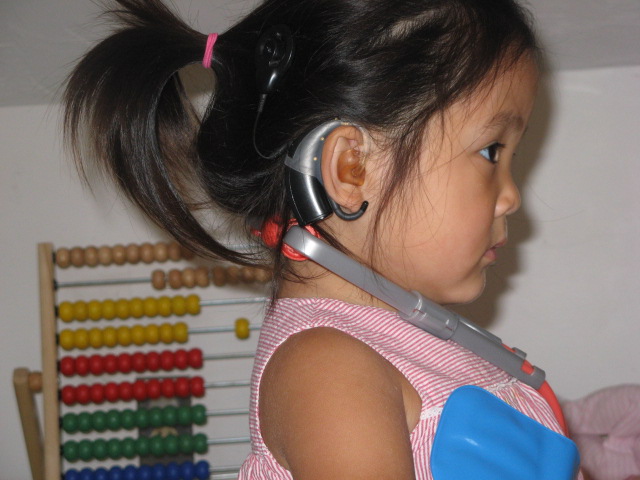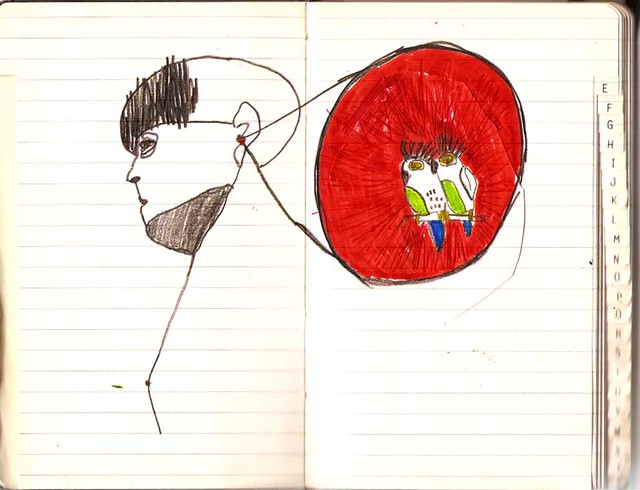Deafness and its Language
Have you ever wondered how your life could change if you lose one of your senses or lose the ability to do something you have always been able to do? For a second, imagine waking up one day not even being able to walk. There are many people who are born deaf or have lost the ability to hear due to infections. Getting the cochlear implant as soon as possible provides a better future for deaf people because it helps them adapt to the environment, communicate better with others, and eliminate limitations like speaking with someone who does not know sign language.

People learn how to speak through the sounds they hear. According to Kral and O’Donoghue: “The acquisition of spoken language requires auditory input and interaction with the environment”. In addition, it’s by means of hearing that people receive information and develop their cognitive and psychosocial abilities. Language comes from imitating the sound we hear and interact with the surrounding.
The brain like humans adapts, develops, and grows. According to Andrej Kral and Gerard O’Donoghue, “Although some of the ability to differentiate auditory stimuli is inborn, a range of sensorimotor, perceptual, and cognitive abilities are acquired during childhood.” Because many skills are learned during childhood, doctors believe that children who wear the cochlear implant would perform better in the future. Researchers argue that a delay in the cochlear implantation decreases brain adaptability and speech understanding (Kral and O’Donoghue). The earlier the cochlear is implanted, the more the cochlear would help them develop communication skills and cognitive abilities.
Others argue that before the cochlear implant was innovated, their family members or friends have been living without any disagreements or serious problems and that there is no need for the cochlear implant to “fix” them. When the cochlear implant was approved by the FDA, many deaf people were unsatisfied. According to Irene Brodsky, an independent filmmaker and the parent of deaf children, “Some deaf people bristled at the implication that they needed to be ‘fixed’ with an implant.” However, the cochlear implant was not designed to “fixed” deaf people but to help deaf people to have the opportunity to hear and experience sound.
Deafness could be seen as someone who needs glasses to be able to see better. In fact, many people who are nearsighted or farsighted would choose to see better through the use of glasses. The idea is similar to the cochlear implant. Glasses are not necessary for survival but it does make someone’s life better and easier to merge with others. In chapter thirteen from El Deafo, Cece has a hard time seeing the words on the board. Later on, it happens that Cece needs glasses. She was actually happy about wearing them because now she sees things more clearly than before and she is not embarrassed to show it to the world: “The faraway stuff that had been so blurry? It’s all so much clearer now!” The cochlear implant is not as common as glasses. To many people, the word “normal” means what is common or what is usual and being different is not “normal”. Deaf people might not feel “normal” simply because they are different from what is common around them. Most people don’t consider having to wear glasses as a disability and neither should a deaf person who needs the cochlear implant in order to hear. After all, people choose what is best for them, but how can kids, under two years old, have this say about what is best for them?
For parents of deaf children, it is hard to decide what is best for their kids, especially when they are provided the option to whether they should give their kid an invasive surgery at the age before two. Parents think that the cochlear implant is not what is best for their kids’ development or they might doubt this decision since there are risk factors that could lead to an infection. However, according to Kral and O’Donoghue, “Major complications occur in about 5% of patients, and the most common complication is an infection.” At the age of 65, Brodsky’s parents were able to decide for themselves to whether have the surgery and get the cochlear implanted or not. But kids do not have this decision in their hands, so the real questions to whether implant their kids is for the parents or guardian. According to Brodsky from the article Between Sound and Silence, “That’s a choice most of us will never make. And it’s one we ultimately decided we want our son to take on for himself.” To whether implant their kids or not at an early age is a decision that would change and impact their kids’ life forever, taking into account that once the surgery performed, the person completely loses residual hearing.
Even after a child is given the cochlear implantation, it is a process of adaptation and learning. As Kral and O’Donoghue say, “For many children with implants, mainstream schooling has become a realistic option.” While there are schools for the deaf, being in a mainstream school could help those wearing a cochlear implant to see from a new perspective and interact with others and not only with people who are in a similar situation. With different people surrounding, deaf kids could think outside the box, feel less isolated and more involved with the community.
Teenagers who wear the cochlear implant might not feel confident about themselves and often question their real self. As Kral and O’Donoghue state, “Adolescence presents additional challenges; many deaf teens have reduced self-esteem and uncertainty about their identity.” This is because they are afraid to show themselves to others. The way one sees themselves can negatively affect one’s confidence and perception of themselves. And perhaps because people tend to judge before understanding. People tend to hide and creates a persona for others, just like Kamala Khan from Ms. Marvel and Cece Bell from El Deafo. Both Kamala and Cece creates this second persona as a superhero to escape from the reality.
Deaf people learn sign language and a hearing aid is not required for survival, however, sign language is limited. For example, there are over two hundred different type of sign languages. Each country, town, and even school of the deaf might have their own sign language. Jean Massieu from Seeing Voices says: “The signs I used to express my ideas to my family were different from the signs of educated deaf-mutes […]. Children my own age would not play with me; I passed the time alone playing with a top or a mallet and ball.” There is no such thing as a “universal sign language” and it is hard to interact with other people there are ways for you to still have a social life but one is limited to that circle since others might not know the type of language the other person knows. Although hearing aid is not necessary for one’s life, people who adapt to wearing a hearing aid, tend to have a better communication and they are not limited to a certain group of people than those who only learned sign language.
There are often limitations of what a hearing aid can do but it is no doubt an improvement from nothing. The cochlear implant is not aiming for something that it is perfect but rather a progress. It is also not a cure but a treatment. So here comes how do people adapt using the cochlear implant? According to Maria Ferreira and Leandro Sant’Anna, “The guidance is one of the critical steps in the hearing aid fitting process because when the patient doesn’t know the functioning, is not able to manipulate it suitably, he or she will have difficulties to make good use of the benefits it avails.” After the cochlear implanted the patient has to go through speech therapy and see a phonoaudiologist. Phonoaudiology is the study of development and improvement of human communication. For patients, there are more things to learn that just the fact that the cochlear implants will give them the ability to hear. It is adapting to society with that new device and learning how to hear too.
Different people have a different perspective on life. For those who lost the ability to hear later on in life either due to an accident or infection, they might find hearing sound a necessity for their lives. However, for those who were born deaf and did get a cochlear implant but learned sign language, believe that the way they are living and interacting with others is just fine and that they would not change their lives just for being able to hear. Although, they believe that there certainly are some struggles. On a survey with the question “Would you ever want to be able to hear?”, conducting participants who are born deaf and has not heard a sound, one of them answered: “Of Course. You have to break through all kinds of obstacles. But I would not want to be a hearing person for the rest of my life. I want to be deaf.” Another one replied, “I would have that sense of feeling normal because so many people in the world are able to hear and you just want fit in. But my identity would suddenly disappear.” These people are proud of who they are and would not trade what they currently have that makes them happy with something else and that is the beauty of different people having different ideas.
In sum, people learn how to speak, develop communication skills and cognitive abilities through the hearing of sound. The sooner one gets the cochlear implant, the sooner one’s brain start developing. Both, people who use the cochlear implant and those who don’t, have thought of trying to fit in because many people in the world can hear and some might feel uncomfortable and embarrassed of showing themselves to the world. However, after therapy and practice, children who use the cochlear implant are able to go mainstream schools, thus feeling less isolated and being able to communicate with different people and not just with those who understand a certain sign language. In terms of identity and adaptation, most people who were born deaf and has never heard a sound, think that being deaf is what makes them who they are. They feel that being deaf and having their sign language is what makes them who they are now. If they learned how to hear and speak then their sign language is meaningless.




